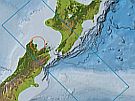Watch the introductory video:
Introduction to Sustainable Seas 2018 from LEARNZ on Vimeo.
Tuesday 6 March
1. Head out for a fish and chat about marine ecosystems
Get your life jacket on and jump a board a NIWA research boat in Nelson. Head out to Delaware Bay and Cable Bay to fish for blue cod and investigate a marine ecosystem.
2. Stina's cod research
Meet Stina, a PhD student from the University of Otago and find out about the research she is doing with blue cod, how she is doing this and what can affect blue cod populations.
3. What is ecosystem-based management?
Talk with Sorrel and Stina from the University of Otago about their work with the Sustainable Seas Challenge and the development of a new tool for managing marine areas.
4. Take a look inside a blue cod
Head back to the NIWA lab in Nelson to dissect a blue cod. Find out what this fish had for dinner, what gender it is and how old it is.
Wednesday 7 March
1. The value of estuaries
Come and explore an estuary in Nelson at low tide and discover why estuaries are such a valuable ecosystem.
2. Ecosystem services
Meet Josie from the University of Otago and find out what services ecosystems can provide and what role cockles play in an ecosystem.
3. Cockle sampling and habitat comparison with Brooklyn School
Join students from Brooklyn School as they complete a cockle monitoring activity. Find out where cockles like to live and why.
4. Impacts on estuarine ecosystems
Talk to Rebecca from the University of Waikato about what can impact estuaries. Find out what can happen to an ecosystem when multiple impacts or stressors occur together.
Thursday 8 March
1. Technology for tracking impacts on the sea and mapping ocean currents
Head back out on the NIWA research boat to help scientists with their work. Check out all the specialised equipment that they use to measure salinity, temperature and depth of seawater.
2. Mapping layers in the ocean
Meet oceanographer Joe O'Callaghan and see how CTD's are deployed and what information they gather. Find out why this information is so useful.
3. What drifters measure and how this is helpful
Set up a drifter and drogue and launch it off the boat. Find out what drifters measure and how this information can help us better understand what is happening in our oceans.
4. Making sense of drifter and CTD data
Head back to the NIWA Lab in Nelson to download the data you have collected and see how this information can be displayed and used to create computer models.




